- Home
- J. G. Ballard
Millennium People Page 2
Millennium People Read online
Page 2
Even I, David Markham, a trained psychologist infiltrated into Chelsea Marina as a police spy – a deception I was the last to discover – failed to see what was going on. But I was distracted by my unusual friendship with Richard Gould, the hard-working paediatrician who was the leader of the revolt – the Doctor Moreau of the Chelsea set, as our shared lover, Kay Churchill, christened him. Soon after our first meeting, Richard lost interest in Chelsea Marina and moved on to a far more radical revolution, which he knew was closer to my heart.
I approached the crime-scene tapes that closed the King’s Road entrance to the estate, and showed my pass to the two policemen waiting for the Home Secretary’s arrival. The driver of a florist’s delivery van was arguing with them, pointing to a large display of arum lilies on the seat beside him. I guessed that a local resident, some happily married solicitor or account executive, had been too busy with the revolution to cancel his wife’s birthday bouquet.
The constables were unmoved, refusing to let the driver into the estate. They sensed that something deeply suspect had taken place in this once law-abiding community, an event that required the presence of a cabinet minister and his retinue of worthies. The visitors – Home Office advisers, concerned churchmen, senior social workers and pyschologists, including myself – would begin their tour at noon, in an hour’s time. No armed police would guard us, on the safe assumption that a rebellious middle class was too well mannered to pose a physical threat. But, as I knew all too well, that was the threat.
Appearances proved nothing and everything. The policemen waved me through, barely glancing at my pass. Having been harangued for weeks by articulate mothers in the scruffiest jeans, they knew that my fashionable haircut, courtesy of BBC make-up, dove-grey suit and sunbed tan ruled me out as a native of Chelsea Marina. The residents would die rather than resemble a minor television guru, a renegade intellectual from the dubious world of video-conferencing and airport seminars.
But the suit was a disguise, which I had put on for the first time in six months, after stuffing my torn leather jacket and denims into the dustbin. I sprang lightly over the crime-scene tapes, far fitter than the policemen guessed. The ‘terrorist actions’, as the Home Secretary termed them, had soon toughened up a lazy physique softened by years of boarding lounges and hotel atriums. Even my wife Sally, forever tolerant and never surprised, was impressed by my muscular arms as she counted the bruises left by scuffles with police and security guards.
But a disguise could go too far. Catching sight of myself in the broken windows of the gatehouse, I loosened the knot of my tie. I was still unsure what role I was playing. Richard Gould and I had been seen together so often, and the constables should have recognized me as the chief accomplice of this hunted terrorist. When I waved to them they turned away, scanning the King’s Road for the Home Secretary’s limousine. I felt a pang of disappointment. For a few seconds I had wanted them to challenge me.
In front of me lay Chelsea Marina, its streets empty as never before in its twenty-year existence. The entire population had vanished, leaving a zone of silence like an urban nature reserve. Eight hundred families had fled, abandoning their comfortable kitchens, herb gardens and book-lined living rooms. Without the slightest regret, they had turned their backs on themselves and all they had once believed in.
Beyond the rooftops I could hear the west London traffic, but it faded as I walked down Beaufort Avenue, the estate’s main thoroughfare. The vast metropolis that surrounded Chelsea Marina was still holding its breath. Here the revolution of the middle class had begun, not the uprising of a desperate proletariat, but the rebellion of the educated professional class who were society’s keel and anchor. In these quiet roads, the scene of uncountable dinner parties, surgeons and insurance brokers, architects and health service managers, had built their barricades and overturned their cars to block the fire engines and rescue teams who were trying to save them. They rejected all offers of help, refusing to air their real grievances or to say whether any grievances existed at all.
The siege negotiators sent in by Kensington and Chelsea Council were met first by silence, then by mockery, and finally by petrol bombs. For reasons no one understood, the inhabitants of Chelsea Marina had set about dismantling their middle-class world. They lit bonfires of books and paintings, educational toys and videos. The television news showed families arm in arm, surrounded by overturned cars, their faces proudly lit by the flames.
I passed a fire-gutted BMW, lying wheels uppermost beside the kerb, and stared at its ruptured fuel tank. An airliner cruised over central London, and hundreds of broken windows trembled under the droning engines, as if releasing their last anger. Curiously, the residents who destroyed Chelsea Marina had shown no anger at all. They had quietly discarded their world as if putting out their rubbish for collection.
This uncanny calm and, more worryingly, the residents’ indifference to the huge financial penalties they would pay, had prompted the Home Secretary’s visit. Henry Kendall, a colleague at the Institute with close Home Office contacts, told me that other sites of middle-class unrest were coming to light, in well-to-do suburbs of Guildford, Leeds and Manchester. All over England an entire professional caste was rejecting everything it had worked so hard to secure.
I watched the airliner cross the Fulham skyline, then lost it among the exposed roof-beams of a burnt-out house at the end of Beaufort Avenue. Its owners, a local headmistress and her doctor husband, had left Chelsea Marina with their three children, after holding out to the last minutes before the police riot teams overwhelmed them. They had been in the forefront of the rebellion, determined to expose the blatant injustice that ruled their lives. I imagined them endlessly circling the M25 in their muddy Land Rover, locked in a deep trance.
Where had they gone? Many of the residents had retreated to their country cottages, or were staying with friends who supported the struggle with food parcels and cheerful e-mails. Others had set off on indefinite tours of the Lake District and the Scottish Highlands. Towing their trailers, they were the vanguard of an itinerant middle class, a new tribe of university-trained gypsies who knew their law and would raise hell with local councils.
Kay Churchill, the film studies lecturer at South Bank University who became my landlady, was arrested by the police and released on bail. Still proclaiming the revolution, she held forth on an afternoon cable channel. Her cramped but comfortable home, with its shabby sofas and film stills, had been drowned by the powerful hoses of the Chelsea Fire Service.
I missed Kay and her shaky crown of ash-grey hair, her erratic opinions and ever-flowing wine, but her abandoned house was my reason for arriving an hour before the Home Secretary. I hoped that my laptop was still on the coffee table in Kay’s living room, where we had laid out our maps and planned the arson attacks on the National Film Theatre and the Albert Hall. During the final moments of the revolt, as the police helicopters hovered overhead, Kay was so determined to convert the handsome fire chief to her cause that his men had ample time to shatter her windows with their water jets. A neighbour had pulled Kay from the house, but the laptop was still there for the police forensic teams to find.
I reached the end of Beaufort Avenue, at the silent centre of Chelsea Marina. A seven-storey block of flats stood beside Cadogan Circle, banners hanging limply from the balconies and offering their slogans to the unlistening air. I crossed the road to Grosvenor Place, Kay’s raffish cul-de-sac and a reminder of another, older Chelsea. The short road had been home to a convicted antiques dealer, two lesbian marriages and an alcoholic Concorde pilot, and was a haven of bad company and good cheer.
I walked towards Kay’s dishevelled house, listening to my footsteps click behind me, echoes of guilt trying to flee the scene but managing only to approach itself. Distracted by the sight of so many empty houses, I tripped on the kerb and leaned against a builder’s skip heaped with household possessions. The revolutionaries, as ever considerate of their neighbours, had ordered a dozen
of these huge containers in the week before the uprising.
A burnt-out Volvo sat beside the road, but the proprieties still ruled, and it had been pushed into a parking bay. The rebels had tidied up after their revolution. Almost all the overturned cars had been righted, keys left in their ignitions, ready for the repossession men.
The skip was filled with books, tennis rackets, children’s toys and a pair of charred skis. Beside a school blazer with scorched piping was an almost new worsted suit, the daytime uniform of a middle-ranking executive, lying among the debris like the discarded fatigues of a soldier who had thrown down his rifle and taken to the hills. The suit seemed strangely vulnerable, the abandoned flag of an entire civilization, and I hoped that one of the Home Secretary’s aides would point it out to him. I tried to think of an answer if I was asked to comment. As a member of the Adler Institute, which specialized in industrial relations and the psychology of the workplace, I was nominally an expert on the emotional life of the office and the mental problems of middle managers. But the suit was difficult to explain away.
Kay Churchill would have known what to reply. As I stepped through the pools of water outside her house I could hear her voice inside my head: bullying, pleading, sensible and utterly mad. The middle class was the new proletariat, the victims of a centuries-old conspiracy, at last throwing off the chains of duty and civic responsibility.
For once, the absurd answer was probably the right one.
The firemen had drenched the house, making sure that Kay would never set it alight. Water still dripped from the eaves, and a faint mist rose from the brickwork. The open-plan living room was a marine grotto, moisture seeping through the cracked ceiling, turning the walls into damp tapestries. I stood between the Ozu and Bresson posters, almost expecting Kay to emerge from the kitchen with two glasses and a bottle of some admirer’s wine, insisting that the battle had been won.
Kay had left, but her cheerful and rackety world was still in place – the Post-it notes on the mirror above the fireplace, the lecture invitations from anarchist groups, and the cairn of white pebbles on the mantelpiece. Each stone, she told me, was a memento of a summer love affair on a Greek beach. Beads of moisture covered the framed photograph of her daughter, now a teenager in Australia, taken on a last holiday before custody was awarded to her husband. Kay had moved on, claiming that memory was a baited trap, last night’s dregs in a lipstick-smeared glass, but sometimes I caught her wiping her tears from the photograph and pressing the frame to her breast.
The sofa where Kay and I had dozed together was a sodden hulk. But my laptop lay among the film scripts and magazines. The hard drive contained more than enough evidence to convict me as Richard Gould’s co-conspirator. There were lists of video stores to be torched, travel agencies to be attacked, galleries and museums to be sabotaged, and the teams of residents assigned to each action. Trying to impress Kay, I had appended notes on the damage done, injuries to team members and likely insurance claims. Tapping out these unnecessary details, Kay’s arm warmly around my shoulders, I sometimes felt that I was unrolling a carpet that ran straight to my prison cell.
Thinking fondly about Kay, I reached out to straighten the portrait of her daughter. A shard of glass slipped from the frame and cut my palm, lightly severing the life-line. As I stared at the bright smear and searched for my handkerchief, I realized that this was the only blood I had shed in Chelsea Marina during the entire rebellion.
Laptop under my arm, I closed the front door behind me. I stared for a last time at the wooden panelling, and in the smooth enamel saw a window move and catch the sun. An open casement swung on the top floor of the apartment building beside Cadogan Circle. Bizarrely, a hand reached out and cleaned the panes, shook a duster and then withdrew.
I stepped into the street and walked towards the apartments, passing a burnt-out Saab sitting in its long-term bay. Were squatters moving into Chelsea Marina, giving up their soft drugs and hard mattresses? Were they ready to try a new lifestyle, to face the problems of school fees and Brazilian daily helps, ballet classes and BUPA subscriptions? Our modest revolution would become part of the folkloric calendar, to be celebrated along with the last night of the Proms and the Wimbledon tennis fortnight.
Pressing the handkerchief to my palm, I pumped the elevator buttons in the hall of the apartment building. Frustratingly, all electric power to Chelsea Marina had been disconnected. I climbed the stairs, resting on each landing, surrounded by the open doors of abandoned apartments, an actor searching for the right stage set. I was light-headed when I reached the top floor. Without thinking, I pushed back the unlocked door and stared across the empty living room at the window that had swung in the sunlight.
A third-floor tenant of the same apartment house, Vera Blackburn, was a former government scientist and a close friend of Kay Churchill’s. I remembered that the top-floor flat was owned by a young optician and her husband. The living-room windows had the clearest views in Chelsea Marina, looking down Beaufort Avenue along the route that the Home Secretary would take on his inspection tour.
I stepped over a discarded suitcase and entered the room. A blue canvas bag lay on the desk, its side embossed with the seal of the Metropolitan Police, part of the equipment carried by riot-control teams. Inside would be stun guns, canisters of tear gas and the cattle prods with which the police defended themselves against their ever-present enemies.
The laptop had grown more heavy in my hand, a half-conscious warning signal. I could hear two people speaking in the nearby bedroom, a man’s curt but low tones and a woman’s sharper replies. I assumed that a police constable and a woman colleague were keeping watch on the Home Secretary’s approach. Methodical to a fault, they had wiped the windows to give themselves the clearest view possible of the Cabinet Minister and his sagely nodding advisers. Finding me in their observation post, they would assume the worst, and soon decide that a psychologist’s laptop was a potentially offensive weapon.
Trying not to trip over the suitcase, I edged towards the door, aware for the first time of the optician’s diagrams pinned to the wall above the desk, target-like circles and rows of meaningless letters that resembled coded messages.
The bedroom door opened and a distracted man in a shabby suit stepped into the living room. The sun was behind him, but I could see his undernourished face, and the light flaring off his high temples. He noticed me, but seemed preoccupied with a problem of his own, as if I were a patient who had called at his surgery without an appointment. He stared through the window at the empty streets and fire-damaged houses with the tired gaze of an overworked doctor trying to carry out his medical work in a wartorn Middle East suburb.
At last he turned to me, smiling with a sudden show of warmth.
‘David? Come in. We’ve all been waiting for you.’
Despite myself, I knew that I was eager to see him.
2
The Heathrow Bomb
MY SEDUCTION BY Dr Richard Gould, and the revolution he launched at Chelsea Marina, began only four months earlier, though I often felt that I had known this disgraced children’s doctor since my student years. He was the maverick who attended no lectures and sat no exams, a solitary with an unpressed suit and a syllabus of his own, but who managed to move on to a postgraduate degree and a successful professional career. He came into our lives like a figure from one of tomorrow’s dreams, a stranger who took for granted that we would become his most devoted disciples.
A telephone call was our first warning of Gould’s arrival. My mobile rang as we were leaving for Heathrow Airport and a three-day conference of industrial psychologists in Florida. I was steering Sally down the staircase and assumed the call was one of those last-minute messages from the Institute designed to unsettle my flight across the Atlantic – the resignation of a valued secretary, the news that a much-liked colleague had gone into rehab, an urgent e-mail from a company chairman who had discovered Jung’s theory of archetypes and was convinced that it outlined the
future of kitchenware design.
I left Sally to answer the phone while I took our suitcases into the hall. A natural mender and healer, she had the knack of making everyone feel better. Within minutes the check-in queues at Heathrow would melt away, and the Atlantic would smooth itself into a dance floor. I stood outside the front door and scanned the crescent for our hire car. A few taxis penetrated into this quiet turning off the Abbey Road, but were soon commandeered by Beatles fans making their pilgrimage to the recording studios, or by well-lunched MCC members swaying from Lord’s cricket ground into the unsettling world beyond pad and crease. I had booked the car to arrive two hours before our Miami flight from Terminal 3, but the usually reliable Mr Prashar was already twenty minutes late.
Sally was still on the phone when I returned to the sitting room. She leaned against the mantelpiece, smoothing her shoulder-length hair with a casual hand, as handsome as an actress in a thirties Hollywood film. Mirrors held their breath around Sally.
‘So…’ She switched off the phone. ‘We wait and hope.’
‘Sally? Who was that? Not Professor Arnold, please…’
Gripping a walking stick in each hand, Sally swayed from the mantelpiece. I stepped back, as always humouring her little fantasy that she was handicapped. Only the previous afternoon she had played ping-pong with a colleague’s wife, sticks forgotten on the table as she batted the ball to and fro. She had not needed the sticks for months, but still reached for them at moments of stress.
‘Your friend Mr Prashar.’ She leaned against me, scented scalp pressed to my cheek. ‘There’s a problem at Heathrow. Tailbacks as far as Kew. He thinks there’s no point in leaving until they clear.’

 High-Rise
High-Rise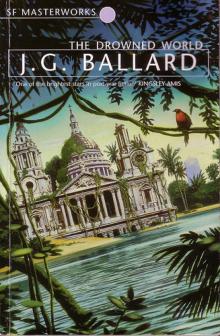 The Drowned World
The Drowned World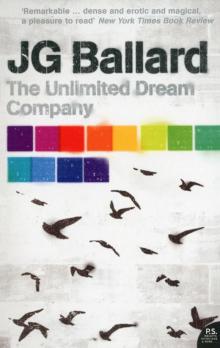 The Unlimited Dream Company
The Unlimited Dream Company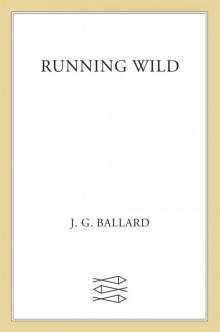 Running Wild
Running Wild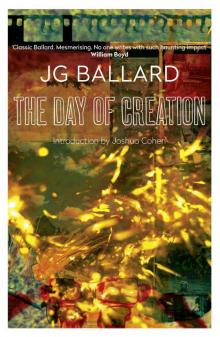 The Day of Creation
The Day of Creation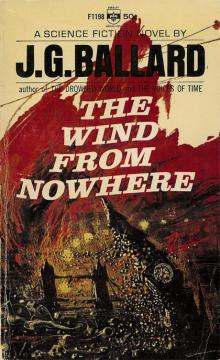 The Wind From Nowhere
The Wind From Nowhere The Complete Short Stories, Volume 2
The Complete Short Stories, Volume 2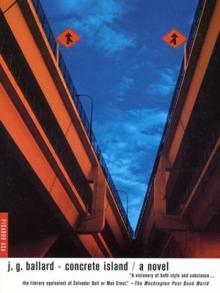 Concrete Island
Concrete Island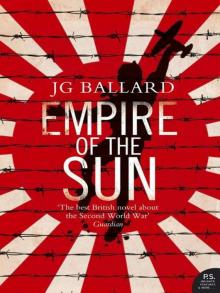 Empire of the Sun
Empire of the Sun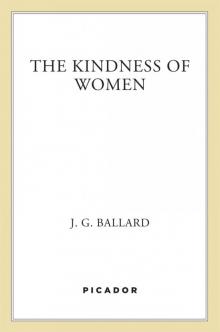 The Kindness of Women
The Kindness of Women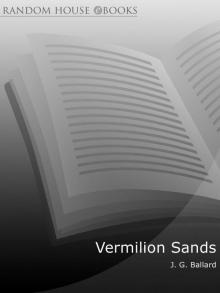 Vermilion Sands
Vermilion Sands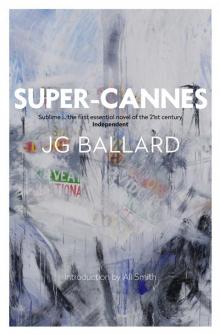 Super-Cannes
Super-Cannes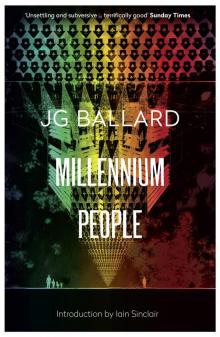 Millennium People
Millennium People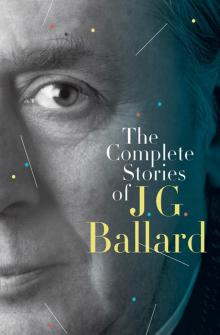 The Complete Stories of J. G. Ballard
The Complete Stories of J. G. Ballard Crash
Crash The Drought
The Drought The Atrocity Exhibition
The Atrocity Exhibition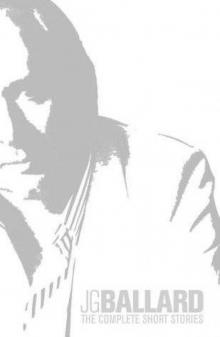 The Complete Short Stories: Volume 1
The Complete Short Stories: Volume 1 Miracles of Life: Shanghai to Shepperton: An Autobiography
Miracles of Life: Shanghai to Shepperton: An Autobiography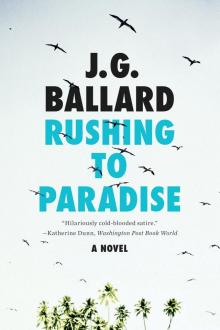 Rushing to Paradise
Rushing to Paradise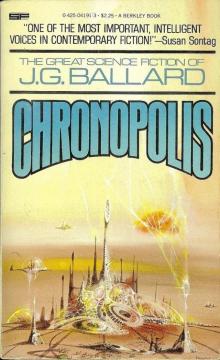 Chronopolis
Chronopolis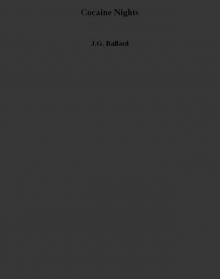 Cocaine Nights
Cocaine Nights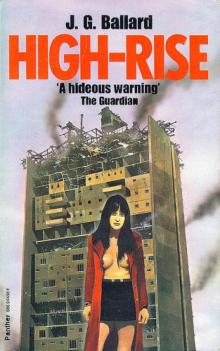 High Rise (1987)
High Rise (1987) The Complete Short Stories
The Complete Short Stories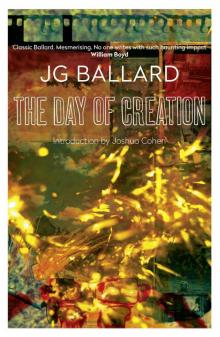 The Day of Creation (Harper Perennial Modern Classics)
The Day of Creation (Harper Perennial Modern Classics)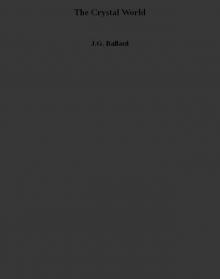 The Crystal World
The Crystal World